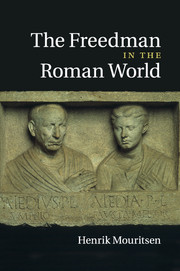Book contents
4 - The power and status of freedmen
Published online by Cambridge University Press: 21 January 2011
Summary
In the eyes of the Romans a freedman could never become equal to an ingenuus. The experience of slavery had destroyed his honour and irreversibly degraded his mind and body. Despite his legal transformation the freedman still possessed his ‘servile ingenium’, and he would always remain inferior to those untainted by servitude. His natural place was therefore at the bottom of the hierarchy of status which formed the basis for Roman society. The stability and success of Rome was founded – at least from an elite perspective – on the maintenance of proper distinctions between people of different class and personal ability. The gradus dignitatis – or ‘scale of honour’ – remained the cornerstone of any free and just society, and Cicero stressed the fundamental inequality entailed by complete equality which ignored the natural differences that are bound to exist between people. He famously declared that: ‘So-called equality is most inequitable; for when the same honour is accorded to the highest and the lowest (who must be present in every nation), equity itself is most unequal.’ The gradus was not just a question of formal rank; it defined who was allowed to exercise authority over whom, and as such reflected the given hierarchy by which the higher being dominates and controls the lower – in the interest of all parties. Disregard for this rule was therefore more than a social transgression; it was in effect a violation of the natural order.
- Type
- Chapter
- Information
- The Freedman in the Roman World , pp. 66 - 119Publisher: Cambridge University PressPrint publication year: 2011
- 1
- Cited by



